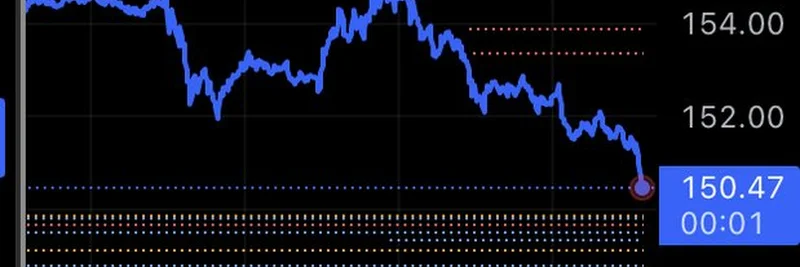Hey there, crypto enthusiasts! If you’ve been scrolling through X lately, you might have stumbled upon a heated thread by MartyParty (@martypartymusic) that’s got the community buzzing. Posted on July 3, 2025, this thread dives deep into alleged market manipulation tied to Binance’s leverage trading practices. Let’s break it down in a way that’s easy to digest, especially if you’re into meme tokens or just curious about the wild world of blockchain.
What’s the Buzz About?
MartyParty’s post features a striking chart showing a sudden price drop to $150.47, linked to the liquidation of high-leverage "Longs" (bets that prices will rise) at 100x and 50x. The claim? This move was orchestrated by transactions involving Binance and a market maker called Wintermute. The chart, which you can see above, paints a clear picture of a sharp dip, suggesting that these liquidations weren’t just market noise—they were intentional.
For those new to the game, leverage trading lets you borrow funds to amplify your trades, like using 100x leverage to control a $10,000 position with just $100. It’s a high-stakes move that can lead to big wins—or big losses. When prices drop suddenly, as shown in the chart, those with high leverage can get "liquidated," meaning their positions are closed, and the exchange pockets the difference. MartyParty argues this is where things get shady.
The Alleged Manipulation
The thread suggests that Binance, alongside Wintermute, might be engaging in what’s known as "wash trading." This is when traders (or exchanges) buy and sell assets to themselves to fake market activity, inflating volumes and tricking others into joining the fray. MartyParty points out that this practice has landed Binance in hot water before, including being ousted from the US market. Now, the concern is that it’s happening globally with no repercussions.
What’s wild is how this ties to leverage trading. Exchanges like Binance offer insane leverage options, which can tempt traders into risky positions. When those positions get liquidated, it’s profitable for the exchange. MartyParty’s take? This isn’t a free or fair market—it’s a system designed to sweep out the "degens" (slang for reckless traders) while the house wins.
Who’s Watching?
MartyParty isn’t just venting—he’s calling out CarolineDPham, the new Chief of the CFTC (Commodity Futures Trading Commission), to step in. The CFTC oversees digital assets in the US, and this thread is a plea for regulation to ensure market hygiene. The idea is that practices like this, while legal in some offshore markets, should be banned globally to protect traders and the integrity of crypto, including meme tokens that thrive on community trust.
What Does This Mean for You?
If you’re dabbling in meme tokens or other cryptocurrencies, this thread is a wake-up call. Market manipulation can affect any asset, even the quirky ones like Dogecoin or Shiba Inu. Here’s what to keep in mind:
- Risk Awareness: High leverage is a double-edged sword. Know the risks before jumping in.
- Market Signals: Sudden drops like the one in the chart might not always be natural—watch for patterns.
- Advocacy: Engage with regulators like the CFTC if you see unfair play. Your voice matters!
The Community’s Reaction
The replies to MartyParty’s post are a mix of outrage and insight. Some, like @machtuk, agree that exchanges benefit from liquidating high-leverage traders, calling it "good business sense." Others, like @StubeStrong, question if centralized exchanges (CEXs) should meddle in price action via offshore market makers. It’s clear this isn’t just a one-off rant—it’s sparking a broader convo about crypto fairness.
Final Thoughts
As we roll into July 2025, this thread from MartyParty is a reminder that the crypto space, including the meme token niche we cover at meme-insider.com, isn’t always the Wild West it used to be. With regulators like the CFTC in the mix and on-chain evidence at our fingertips, transparency is key. Whether you’re a blockchain practitioner or a casual trader, staying informed about these dynamics can help you navigate the market smarter.
What do you think? Is this a case of clever business or outright manipulation? Drop your thoughts in the comments, and let’s keep the discussion going!




